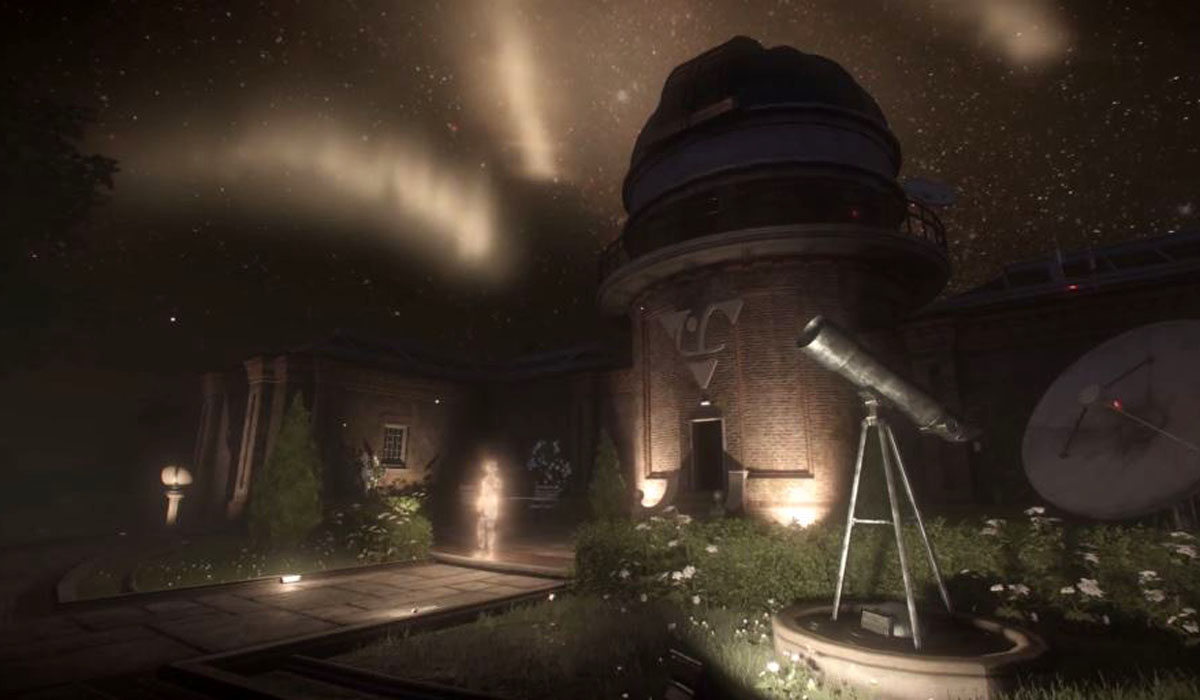Yaughton,
Shropshire, 1984. “It’s all over”. Kate is “the only one left.”
And that’s
how Everybody’s Gone to the Rapture
begins: our protagonist – is it Kate, a spectral version of her, or someone,
something, else entirely? – looking down from the gates of the observatory to
fictional Yaughton below, its church spire and cluster of houses, an idyllic
mid-summer glow inviting us in.
For a
game in which we technically see no people; only their after-images,
occasionally witnessed as ethereal snatches of whirling light, or hear their
voices reverberated back to us through payphones and achingly anachronistic
bricks of mobile phones, Rapture does
an incredible job of detailing a cast of characters in an entirely believable
mid 80s English village. Yaughton may be fictionalised – something between the
Shire and Midsomer – but it feels like a place we’ve all been to, or seen on a
post card, or heard an old Uncle sentimentally pine for. Immediately, the game
brings to mind the recent ITV drama, Broadchurch
(the ‘event’ having already happened); later I was put in mind, depending
which locale of Yaughton I witnessed, and in which light, of everything from
Stephen King’s Misery to Fumito Ueda’s
Ico. Invariably, though, such
comparisons do the game no favours; Rapture
shines – and my, how it shines – because there is nothing quite like it, on TV,
in film, literature or on console.
The fact
that the game is set in 1984, obvious Orwellian nods aside, is not just an
aesthetic choice on the part of developers, The Chinese Room. Yaughton’s mid 80s
cast of parochial characters, their village hall with its production of Peter Pan (surely another nod?), their
two quaint pubs (‘ale and a curry: £2’, advertises The Seventh Whistler), their
pre-curve, pre-sleek cars, their fat televisions, their lack of internet,
their... insular, squabbling village-ness, all of it feels deliberate. This is
not a game that would have worked in contemporary London, or Tokyo, or just
about any other city, for that matter.
Normally
in a review, one would expect some recounting of the plot by about this stage.
But here’s the thing: with Rapture,
it’s all already happened. And that’s the beautiful simplicity of the game: you’re
free to piece it together, liberally, as you drift around (and, make no
mistake, you do drift, entirely ghostlike, in every sense) through deserted
Yaughton, with its kitsch holiday camp and two-platform train station and not
entirely un-Red Riding Hood woods,
trying to work out what the Hell has happened to everybody.
For some,
this momentum – or its absolute lack – has been too much of a barrier to the
game’s enjoyment, but surely that misses the point. Yes, you can’t sprint; yes,
you can move a little bit slower than
dream pace if you hold down R2, but why would you want to? The real joy of Rapture is in the details: spending time
exploring the houses, reading the signs in the bus shelters (items needed for
fete; meeting to protest new observation tower; cast members needed for Peter Pan, etc.); marvelling as the
light catches the canopy of leaves as the sun tilts and angles.
Drifting
through the game – and there really is a sense that one does, a la Guy Debord’s
Situationist Theory, ‘dérive’ through this landscape – the experience becomes
more and more intense just as it becomes more and more lonely. While the player
learns more – of the various characters and their back stories, their
prejudices and their relationships – increasingly these revelations and plot
twists, minor sub-dramas unfolding like snatched episodes of The Archers, begin to feel obscure,
meaningless, and, ultimately, irrelevant. Even as the narrative shifts towards
its ‘climax’, with the two central characters, Kate and Stephen, and their
complicated motivations and actions spiralling towards the dénouement, the
overriding sense of Rapture is that
none of it matters; everything that has been will always be, and may be again.
Here, of
course, is where the game’s various nods to astrophysics and philosophy could
be mulled over, twisted, and mulled over again. Would we, in listing, probing and
arguing over potentially limitless theories, ever reach a satisfying
conclusion? I think not.
I ‘finished’
the game in around ten hours, but I suspect a second, and even third or fourth,
play through would be an enriching experience, as I’m almost certain I didn’t
reveal all of the ‘clues’ or find out all of the characters’ persuasions.
My enduring memory of Everyone’s Gone to
the Rapture will be its superb blend of audio-visuals: the way, hovering
between rugby posts, you half hear the game that played out days, weeks before;
the way that air-raid sirens drift on the wind just as trails of light from the
bombers they were warning against hang in the air like ribbons; the way
payphones burr from incandescent red boxes and you approach them, never quite
knowing where from, when or how the message has come to you. It’s the way you
genuinely feel a chill on your spine as the balls of light, orbs of power,
approach you and you tune and twist them, manipulating echoes of shrill then
din, past voices back through their star gates, their portals. It’s the way you
feel spooked yet comforted the first time it goes dark as you walk through the
woods and tiny balls of light rise like stoned fireflies; or how the silhouette
of the windmill catches against the universe of stars beyond and the brightness
and otherworldliness of all the lights, strung out but coalescing, as you
ascend the observatory.
When the
final credits rolled, I put my controller down and closed my eyes as the choral
soundtrack – that gut-wrenching, hallucinatory music which peppers so many of
your encounters in the game – started up again. I sat back, not quite knowing
what I’d experienced, but feeling a heady mixture of elation and sadness that
it was over.


No comments:
Post a Comment